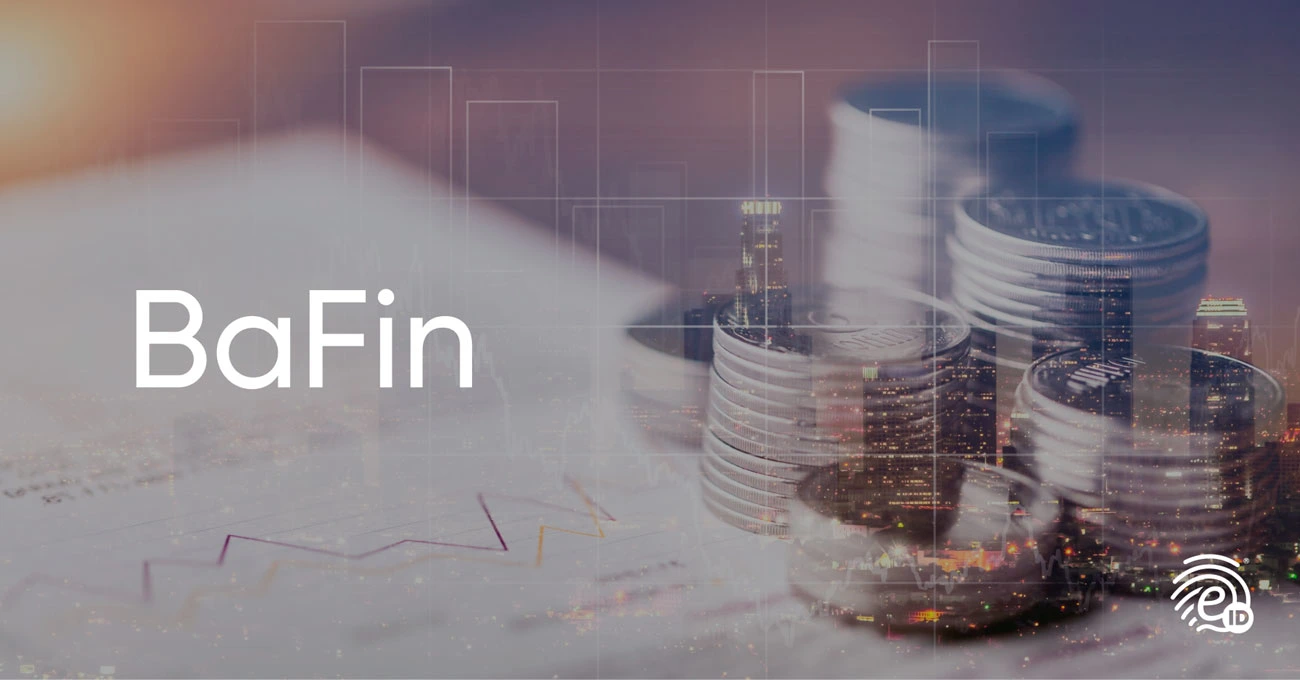BaFin (Federal Financial Supervisory Authority): What is it?

The Federal Financial Supervisory Authority, better known as BaFin, is the German financial services regulator. BaFin ensures the financial oversight of credit institutions, payment service providers, insurers, pension funds, and assets management companies. This post tells you about the role of BaFin in Germany, and how it is innovating its approach as a regulator to combat money laundering.
What is BaFin?
BaFin is Germany’s financial regulator, and is responsible for regulating banks, insurance firms, financial institutions, as well as cryptocurrency companies. It was created in 2002, following the merger of the Banking Supervisory Office, the Supervisory Office for Securities Trading, and the Insurance Supervisory Office. BaFin’s meaning is derived from the German acronym for the Bundesanstalt für Finanzdienstleistungsaufsicht (Federal Financial Supervisory Authority). Due to the size of the German economy, the German financial services regulator is one of the largest financial regulators in the EU.
What is BaFin’s core mission? BaFin works to protect the integrity and stability of the German financial market by ensuring participants comply with relevant laws and BaFin regulations. BaFin in Germany is an independent institution, with legal capacity, that reports to the German Federal Ministry of Finance.
BaFin’s role in Germany
As the financial supervisor and regulator of Germany, the primary role of BaFin is to ensure the integrity and stability of the German financial system. BaFin’s powers of oversight are derived from legislation that stipulates the functioning of Germany’s financial system. In accordance with its solvency powers, it ensures key financial sector actors, such as banks, financial services and insurers, maintain their payment obligations. Bafin’s insurance, banking and securities supervision is supported by a strong legal base and organisation.
The German Federal Financial Supervisory Authority is also responsible for licensing banks and financial institutions as well as providing ongoing supervision of compliance with BaFin’s regulations. It conducts investigations into compliance violations, by collecting and evaluating financial statements from financial institutions. To ensure transparency, a Bafin database of companies is maintained and made public, listing companies such as authorised financial services institutions and exempted institutions.
At the international level, Germany is part of the Financial Action Task Force (FATF) and the Basel Committee on Banking Supervision (BCBS). BaFin works actively with these organisations to strengthen international AML/CFT standards and drive innovative approaches to fight financial crime.
BaFin has received global praise for its forward-thinking approach to sustainability. As a recent example, the institution is paving the way to guide environmental, social and governance (ESG, also known as Bafin’s ESG) funds to combat greenwashing. Bafin’s ESG guidance was recently finalised after an initial consultation to collectively improve its initial draft.
Schedule an appointment here and access 508 million consumers thanks to the European standardization of customer onboarding.
BaFin against Money Laundering
As the European Union’s largest economy, Germany has become a financial focal point for business and investment. However, alongside its booming finance sector, Germany has become a key destination for criminals seeking to launder money and finance terrorist activities, with an estimated €100 billion being laundered in Germany every year. In response, BaFin has started stamping out money laundering and terrorist financing by introducing more stringent regulations and safeguards.
As Germany’s financial watchdog, BaFin plays the central role in coordinating efforts to protect the German financial system from money laundering and terrorist financing. The AML and CTF objectives are achieved via overseeing the BaFin compliance of all relevant statutory regulations.
In order to centralise its anti-money laundering objectives, BaFin established in Germany the Department for the Prevention of Money Laundering in 2003. The department provides oversight of all financial actors as stipulated in section 50 of the German Anti Money Laundering Act (Geldwäschegesetz – GwG). The GwG is Germany’s core piece of anti-money laundering regulation, which requires all economic entities operating in Germany to play an active role in AML and CTF efforts.
As a member of the EU, Germany enacts the European Parliament’s Anti-Money Laundering Directives (AMLD) as well as the Revised Payment Services Directive (PSD2) and electronic IDentification, Authentication and trust Services (eIDAS) regulation. The key changes from the 6AMLD, which Germany passed in October 2020 includes: the synchronisation and expanded definition of money laundering predicate offences, the expansion of criminal liability to legal persons, as well as introducing tougher punishments. Bafin’s PSD2 and eIDAS implementation stood out by pushing and regulating the use of video-identification procedures as an adequate identification method in Germany.
However, Germany’s Anti Money Laundering Act goes beyond the measures set forth in the 6AMLD, by removing the definition of ‘predicate offences’ and instead defining profits gained from any type of criminal activity as a money laundering offence.
Finally, in accordance with FATF recommendation, BaFin’s compliance regulations require obliged entities in Germany to introduce risk base compliance programs with a AML/CTF response proportional to the risk posed by a customer. Consequently, the risk profile derived from customer’s onboarding and regular assessment influences all aspects of the AML/CTF response. Riskier customers are subject to enhanced due diligence measures, and specific transaction monitoring is set to detect activities that do not fit the defined risk profile.
Video identification procedure with BaFin in Germany
On April 10 2017, BaFin published circular 3/2017, which established new benchmarks and requirements for video identification in Germany. It aims to further strengthen secure identification and prevent criminal offences, whilst also maintaining a user friendly experience. All obliged entities under the German Money Laundering Act may make use of the video identification procedures set forth in the circular.
BaFin’s video identification procedures must facilitate customer calls for seamless video identification, whilst also providing police authorities reliable identification of individuals as set out in the German Anti Money Laundering Act. The technological requirements for video identification now include mandatory end-to-end encryption. Video identification procedures may be used for all international and domestic identity documents that are tamper proof, contain a machine-readable zone and verifiable optical security features. The inspection of security features must meet three of the following four criteria:
Optically diffractive features (holograms)
Personalisation technology
Material
Security printing
ID documents that do not pass these criteria are ineligible for video identification. In addition, all video and audio recordings of the entire identification process, including photos and screen shots, must be kept for five years and in a manner that allows audits by BaFin.
Our online identity verification service VideoID complies with German requirements. Powered by artificial intelligence and machine learning, VideoID ensures 100% reliability, in line with requirements imposed by the remote identity verification regulators.
If you want to know in detail and in a practical way how our solutions can help you in Germany and Europe, feel free to request a demo.
BaFin and cryptocurrencies: relationship and goals
BaFin has been pioneering novel approaches towards the regulation of cryptocurrencies within the EU. As of 1 January 2020, cryptocurrencies were included as a financial instrument within the German Banking Act (Kreditwesengesetz – KWG). Consequently, all companies providing cryptocurrency services in Germany must now apply for authorisation from BaFin.
BaFin’s cryptocurrency regulation has shown its eagerness to beef up crypto supervision and move beyond the standards established at the EU level. Specifically, Germany has introduced changes relating to Crypto Custodial Services and Crypto Assets and now classifies them as regulated financial instruments. Bafin’s definition of Crypto Assets is far-reaching (even broader than AMLD5) in order to capture any electronic tradeable asset.
Whilst Germany is moving towards a more regulated approach to cryptocurrencies, the proposed changes are designed to be attractive to crypto businesses in order to create a unified Decentralised Finance (DeFi) market. Importantly, BaFin is now pushing for its approach to crypto to be adopted across Europe.
Like this project
Posted Oct 30, 2023
The Federal Financial Supervisory Authority (BaFin) is the German financial services regulator. Discover in this article the role of BaFin in Germany.
Likes
0
Views
56
Tags





